From Day one when attendees explored a range of issues, from digital technologies’ potential in creating a “borderless Africa” to innovative approaches in healthcare, education, and energy. On the second day the first panel of the day, titled “Developing Human Capital, Job Creation, and Talent Retention for People-Driven Development in Africa,” was a crucial discussion on the future of the continent. Panelists explored strategies to develop African workforce skills, create sustainable jobs, and encourage young talent to remain in Africa. Key topics included aligning educational systems with labor market needs, developing entrepreneurship and SMEs, implementing public policies to attract and retain talent, and leveraging ICT for job creation.
As AJAN strives to ignite the spirit of Innovation among the youths in Africa, one standout session was the presentation by Scolastique GBAGUI, a participant in the JYSEA program from Benin and a representative of the Center for Research, Study, and Creativity (CREC), presented her innovative project. She developed Bio-Toko, a natural soap made from palm tree residues. Her initiative aims to preserve a disappearing traditional skill and sparked enthusiasm among the audience, with many attendees expressing interest in her product. Her presentation is a testament to the success of AJAN JYSEA program in fostering innovation and entrepreneurship among young people in creating positive change in their communities.
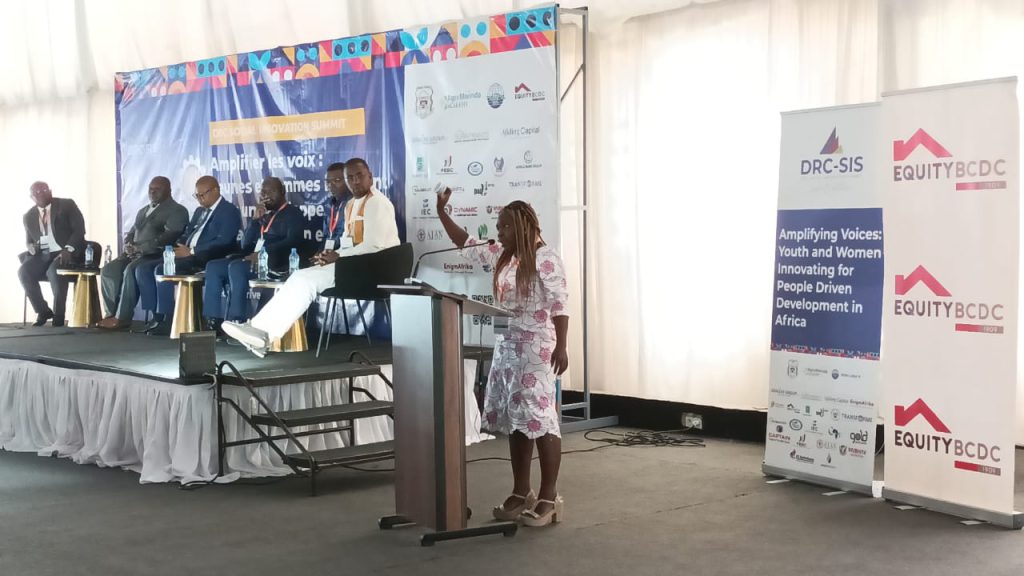
After her presentation, we caught up with Scolastique GBAGUI. She shared, ‘This summit was an incredible experience. I appreciate the warm welcome and presentations. The summit allowed me to acquire more knowledge through collaboration and provided an opportunity to refine my product. It’s an unforgettable experience. As you can see, my soap is a natural product made from residue of a palm tree, very safe and effective for health.'”
The second panel of the day, titled “Systems Thinking and Innovative Interventions Toward People-Driven Transformation of Local Resources,” featured discussions on how systemic approaches can transform local resources into sustainable development drivers. Panelists shared their entrepreneurial journeys and insights on this topic. Key topics included sustainable valorization of natural resources, development of local value chains, and integrating local communities in development processes. Participants agreed on the idea of leaving behind not only material wealth but also a conducive environment for well-being through collective leadership.
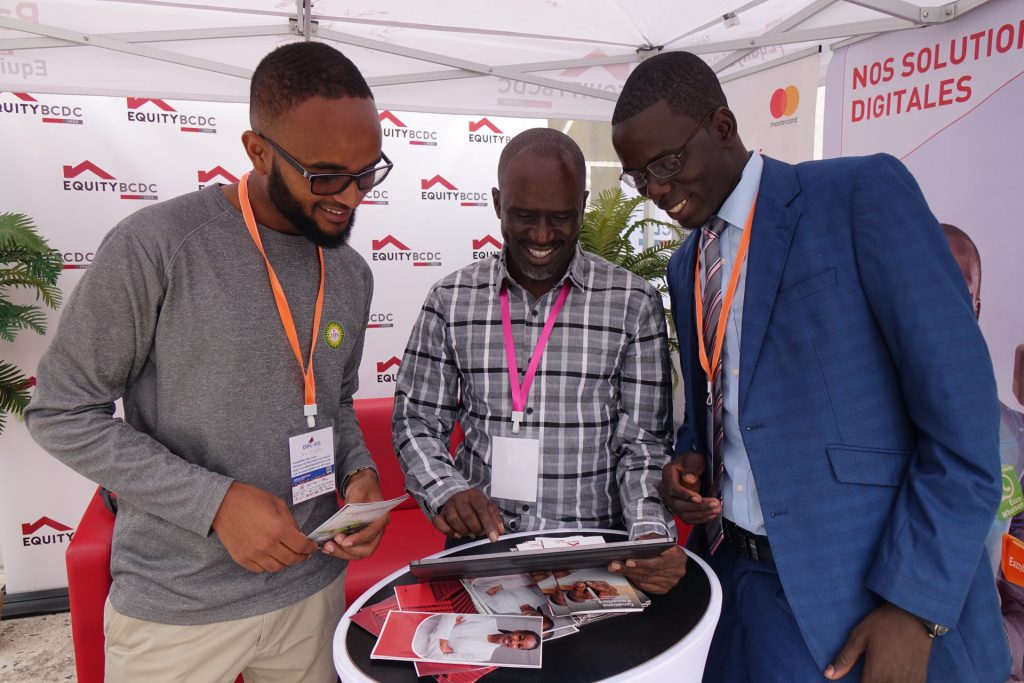
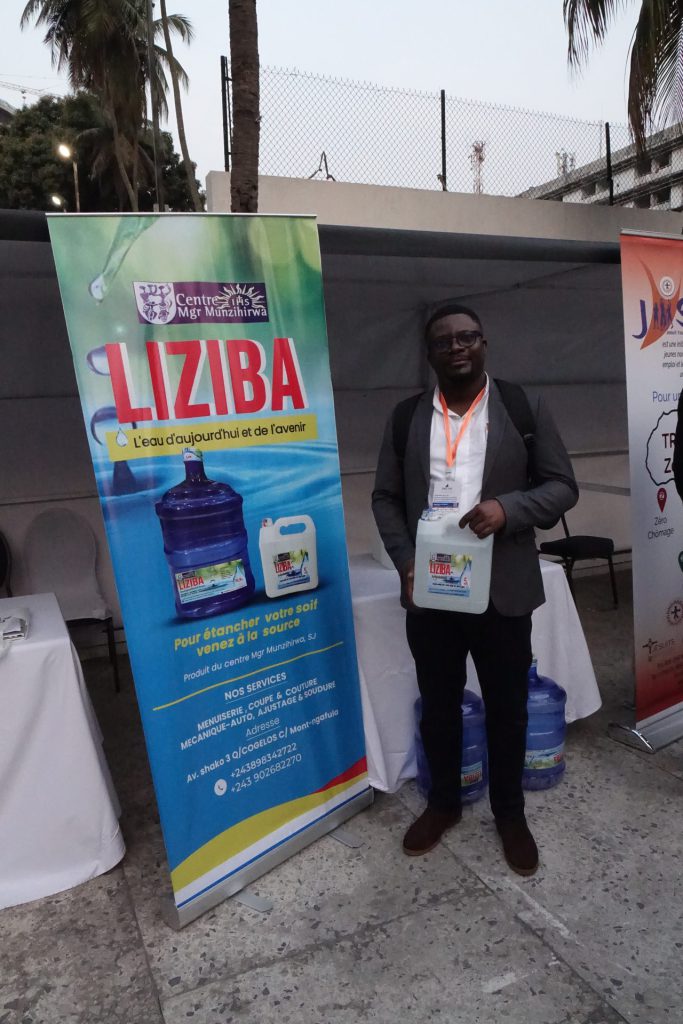
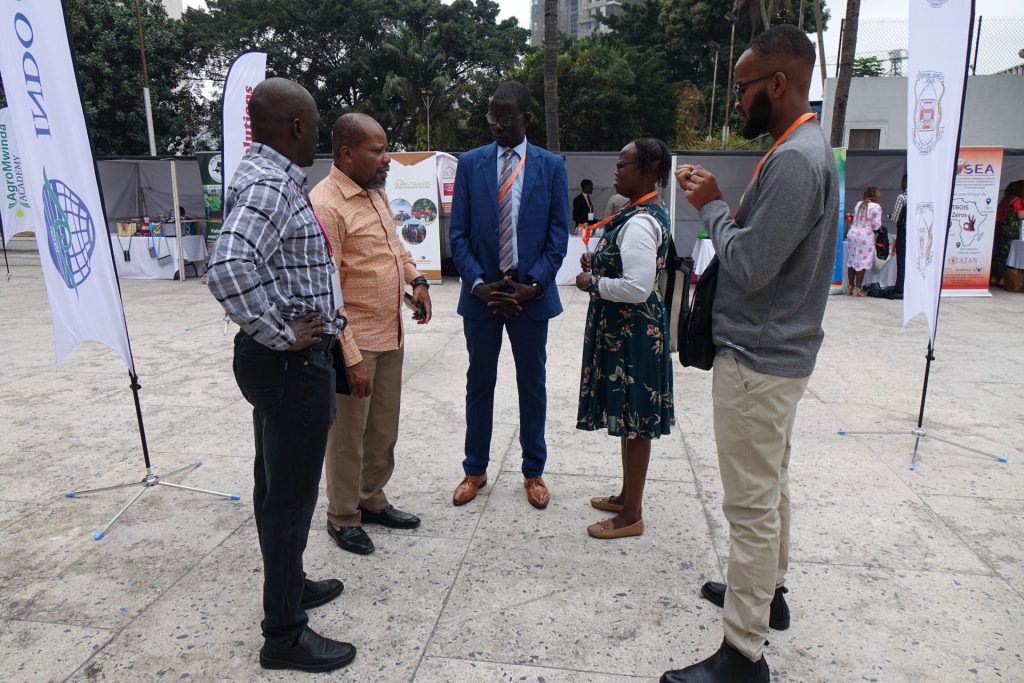
The images above show AJAN delegates at the exhibition center during the DRC-SIS 2024 summit. Fr. Olivier Mushamuka SJ, Director of Centre Mgr Munzihirwa (CMM), is prominently featured holding a 5-liter can of purified water produced by the CMM Center in the DRC. The photo showcases the CMM’s commitment to providing clean water and promoting sustainable development.
The third panel, titled “Innovations in Healthcare: Alternative and Integrative Medicine,” focused on the use of medicinal plants. Researchers discussed Africa’s challenges, including the lack of equipment for international competition, and presented research on essential oils, highlighting their antibacterial and antioxidant properties and potential applications against sickle cell disease.
Simultaneously, other workshops were held, including “Innovations in Water, Waste Management, and Sanitation” and “Youth Education for Social Innovation and Job Creation.” Prof. Jonas yawovi Dzinekou Director of Institute for Social Transformation Tangaza University College (IST- TUC) emphasized the need to create an ecosystem that supports entrepreneurs and helps them reach critical mass. He announced that this topic would be a central focus in the next edition of the summit.
AJAN’s eight young delegates, selected from the Jesuit Youth Social Entrepreneurship Action (JYSEA) program, participated in the summit, and three of them had the opportunity to showcase their innovations. They engaged in discussions on fostering social innovation and entrepreneurship across Africa. These youth represented a broader movement within the summit, where speakers advocated for a shift from profit-driven business models to those focused on community impact.

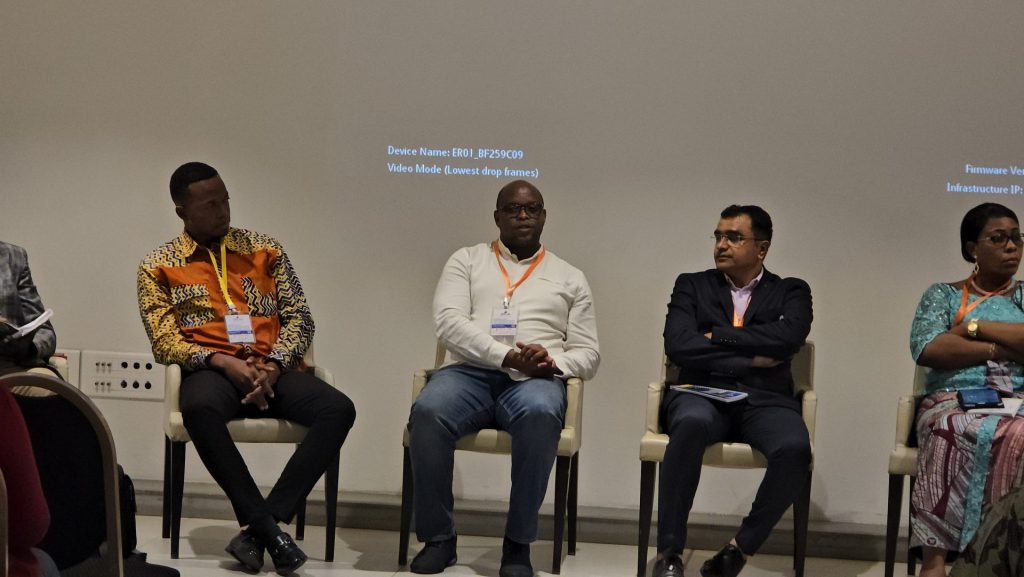
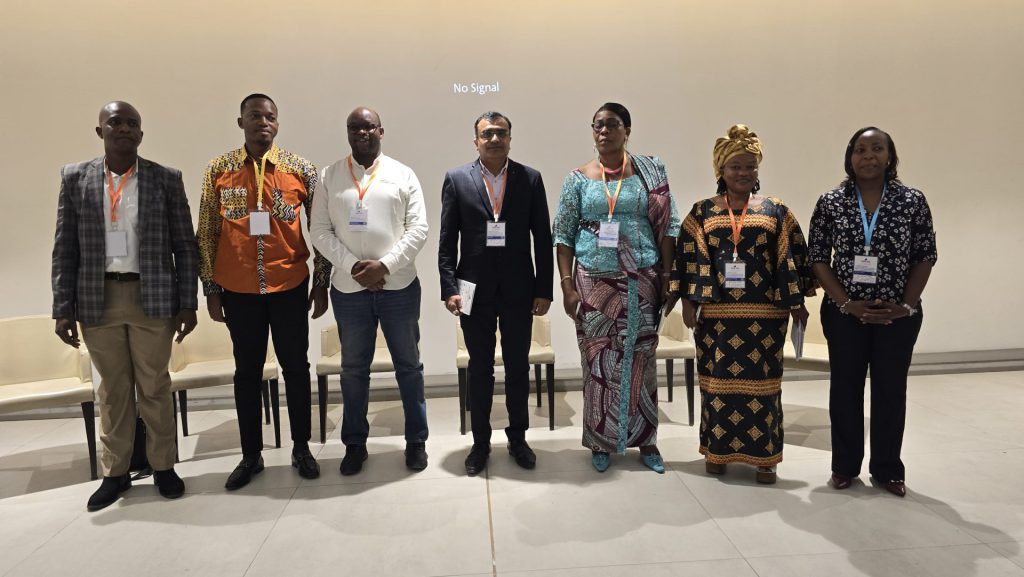
Fr. Gregory Mulobela SJ, (White shirt) Chikuni Home-Based Care Director and implementor of the JYSEA Program in Zambia, one the panelist during one of the breakout sessions at the DRC-SIS 2024.
As a panelist at the DRC Social Innovation Summit, Fr. Gregory Mulobela SJ, Chikuni Home-Based Care Director and implementor of the JYSEA Program in Zambia, said, “As we accompany young people, being here at the DRC Social Innovation Summit has been a great place to see social enterprises in action from from small to large scale solving problems in Africa. Knowledge gained from this conference would be resourceful as we encourage young people to be innovative, solve problems in their communities but at the same time be able to generate funds and income to keep this good initiatives going in our communities. Thank you to AJAN for this opportunity and for the profitability of the Network as we continue to work with young people towards social innovation.”
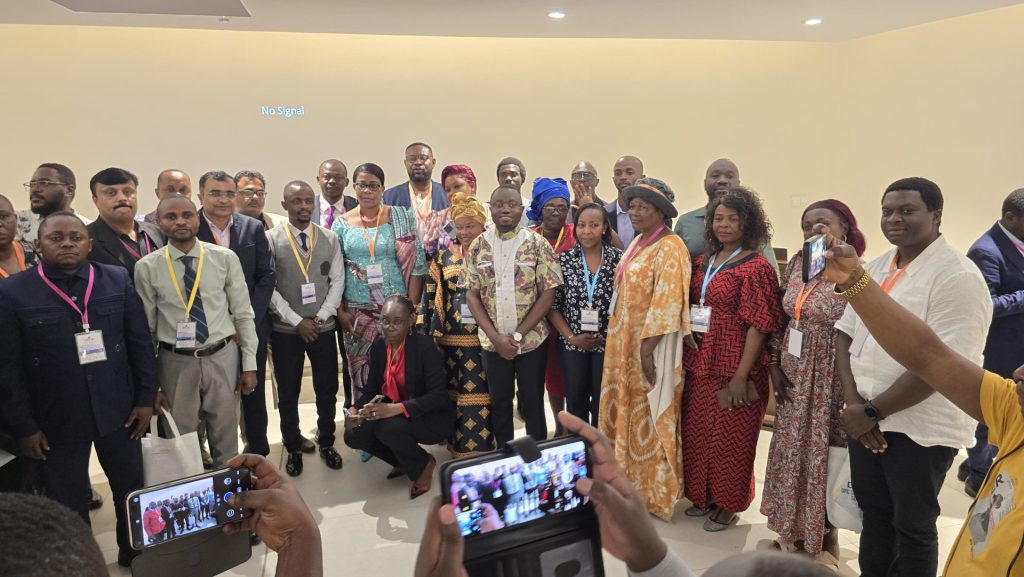
Fr. Mutesha Terry SJ., AJAN delegate from St. Josephs Parish in Kasungu Malawi said, “The summit has been an eye-opener for many aspects of our lives, especially since the initiative came from Africans who want to make a change in the continent by inspiring young people. I am taking back the knowledge and experience gained to Malawi to work with young people and encourage them to be innovators by utilizing natural resources for the greater good of the people and the conservation of the environment. This has been a valuable platform for networking and interacting with people from different parts of Africa who have showcased their innovations. We have identified areas for improvement and will implement the gained knowledge into our ongoing programs to continue supporting the youth in Africa.”
Mr. Symphorien Mpyana in his final remarks promoted the idea of developing an ecosystem for social entrepreneurship in the DRC, highlighting the country’s strategic position. He formally invited several personalities to inaugurate the Federation of Social Enterprises of Congo (FESCO), a platform dedicated to Congolese social enterprises. The ceremony concluded with an address by the Governor of Lomami Province, Iron-Van Kalombo, who officially declared the end of the third edition of the Social Innovation Summit.
By, Fernando Nimbu
AJAN Liaison Officer.
Click to Read: Day One of the DRC Social Innovation Summit: Amplifying the voices of youth and women in social innovation

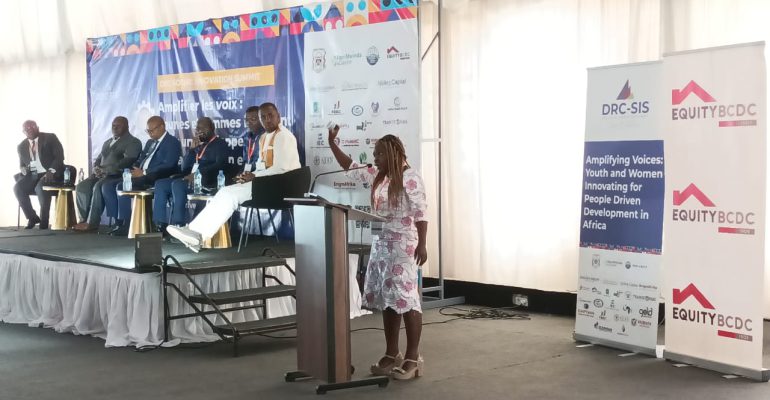
Comments are closed.